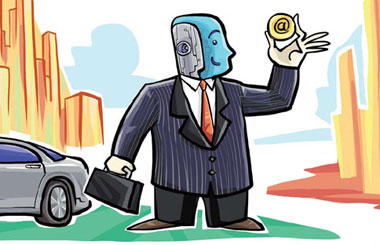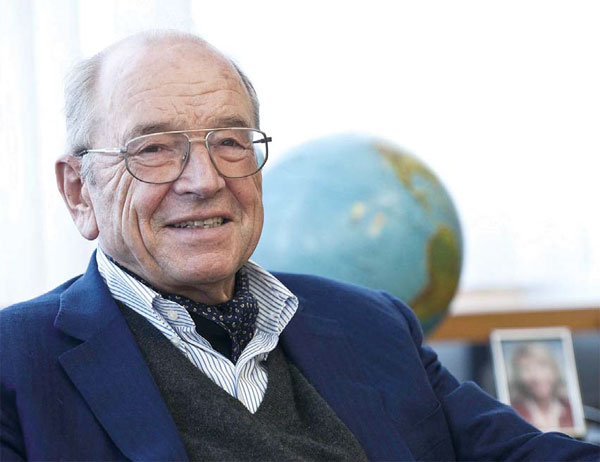Confucian wisdom from sage of Swabia
Updated: 2016-05-06 06:57
By Vincent Fan(China Daily Europe)
|
|||||||||
Founder of Putzmeister tapped into ancient philosophy to build world-class business
Wide-eyed students flocked around Karl Schlecht as he prepared to tuck into spring rolls and steamed buns after speaking at the opening of Tubingen University's China Center in Germany.
The food went untouched until the 83-year-old had finished chatting and posing for pictures with his wellwishers.
|
|
"I love Chinese food," he says as he eventually heads for the buffet, which had been laid on for the 200 or so people invited to the event.
Sporting a bright-red tie, white shirt and double-breasted navy-blue suit, and wearing thin-rimmed glasses, he looked and sounded more like the students' favorite grandpa than a benefactor who once ruled a construction machinery empire that helped build the world's tallest skyscrapers.
Born in a small Swabian town near Stuttgart in 1932, Schlecht learned to mix and lay mortar and concrete from his father, a master plasterer.
"It was back-breaking," he recalls. "I saw him returning home every day with very dirty clothes. He would moan about why there wasn't a machine to do the job."
While studying at the Technical University of Stuttgart in the late 1950s, the young Schlecht answered his father by designing an automated mortar machine, which he assembled in his garage. "My father was rather proud of me," he says with a smile.
Before graduating college, Schlecht started a company that would help change the face of civil engineering, riding on the crest of Europe's post-war construction boom. Half a century later, Putzmeister has become not only a global leader in concrete pump makers, but also the embodiment of the mittelstadt - Germany's small or medium-sized family-owned businesses with time-honored traditions, values and management practices (think Bosch and Trumpf).
In 2012, Schlecht astonished the world by selling the empire he had built single-handedly to a Chinese rival, Sany Heavy Industries, for a reported 560 million euros ($643 million). It was said at that time to be the largest single German-Chinese business transaction.
The deal raised more than a few eyebrows. The German businessman was lambasted for "selling the German soul to the Chinese", while Sany was mocked as "a snake that swallowed an elephant". Workers even staged a strike at the Putzmeister headquarters to protest the sale.
Schlecht insists it was the right deal, and all the proceeds went to his charitable foundation. It would have been unreasonable for Putzmeister, which had been China's market leader since 1979, to compete with a new dominant force in the world's biggest market, he says.
The two competitors shook hands after just two hours of negotiations, he says. They saw eye to eye on a key issue - trust - and he empathizes with the humble roots of Liang Wengen, the founder of Sany, a backyard soldering stick maker turned billionaire entrepreneur.
"Chinese entrepreneurs have exactly the same mentality, hopes and ambitions as us in the West. When you are successful at home, you want to go abroad to grow your businesses," Schlecht says, punching the air with his fist.
"If your eyes are wide open, you can learn a lot from others, including the Chinese. They are ambitious, innovative, smart and hardworking."
In addition to his charitable causes, Schlecht now serves as an adviser to Sany's chairman, once China's richest man.
One of the first tips the German offered to Putzmeister's new owner came from an unexpected source: Confucius. Years before the Sany deal, Schlecht, a self-taught philosopher, became fascinated with Confucianism, especially the notion of "Confucian entrepreneurship", which calls for applying ancient Chinese wisdom to business practice.
According to the German businessman, Confucius underlines essential elements of true entrepreneurship: trust, honesty, tolerance, love and responsibility. These are values he describes as the nuts and bolts of a global ethic for success, which he has championed.
After the takeover, Schlecht persuaded Liang to become a joint patron of the World Ethics Institute at Peking University. A few years earlier, Schlecht had financed a similar institution at Tubingen.
He now devotes most of his time to his charitable foundation, KSG, which has a long list of projects, including clean energy research and good leadership.
Schlecht says the China Center at Tubingen, which is 30 minutes' drive from where he assembled his first mortar machine, was founded with an ideal: to make students aware of each other's history and of the forces that propelled China to become the world's second-largest economy within a generation.
And it seems age cannot slow him down. He starts every morning with a 200-meter swim and then a workout on a rowing machine. Evenings find him helping his wife, Brigitte, make his favorite Swabian noodles or pizza before he retreats to his home office to "fantasize" about new projects.
A voracious reader, he goes to bed to re-read Erich Fromm's The Art of Love or maybe a John Rockefeller biography. If old friends visit, he puts down his gardening tools to collect them at the airport in his black Mercedes. From behind the wheel, the silver-haired Swabian then doubles as an animated tour guide to the picturesque Neckar Valley, his childhood home.
So what's his secret to such a robust and fruitful a life? "Love is what drives me," he says. "I love what I do, love the people around, love to learn and love to give."
vincentfan@chinadailyuk.com.cn
( China Daily European Weekly 05/06/2016 page19)
Today's Top News
Testing times
Big hopes as China hosts the G20
Inspectors to cover all of military
Britons embrace 'Super Thursday' elections
Campaign spreads Chinese cooking in the UK
Trump to aim all guns at Hillary Clinton
Labour set to take London after bitter campaign
Labour candidate favourite for London mayor
Hot Topics
Lunar probe , China growth forecasts, Emission rules get tougher, China seen through 'colored lens', International board,
Editor's Picks

|

|

|

|

|

|








